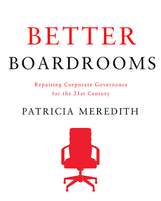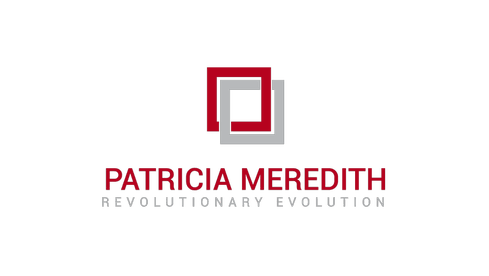Better Boardrooms - Repairing Corporate Governance for the 21st Century

Patricia Meredith
This is the third book in a trilogy. The first volume Catalytic Governance: Leading Change in the Information Age, co-authored with Steven Rosell and Ged Davis, set out a process for leading transformational change, based on their experience with the Canadian Task Force for the Payments System Review. The second book Stumbling Giants: Transforming Canada’s Banks for the Information Age, co-authored with James Darroch, examined how poorly positioned the Canadian banks are to withstand the social and technological tsunami sweeping over financial services. That book was primarily aimed at the enthusiastic young bankers who realize that their industry must change if it is to regain its reputation as a vibrant enabler of economic growth. But as it made clear, the dreams of these men and women will not be realized unless a broad cross-section of Canadians – policy makers and regulators, customers, suppliers, investors, and not least, the bankers themselves – work together to create a banking system better suited to the 21 st century. Better Boardrooms Repairing Governance for the 21st Century covers a much bigger and more pressing challenge: the need for a new system of corporate governance that takes account of the fast-changing business environment and the demands of all stakeholders.
This is the third book in a trilogy. The first volume Catalytic Governance: Leading Change in the Information Age, co-authored with Steven Rosell and Ged Davis, set out a process for leading transformational change, based on their experience with the Canadian Task Force for the Payments System Review. The second book Stumbling Giants: Transforming Canada’s Banks for the Information Age, co-authored with James Darroch, examined how poorly positioned the Canadian banks are to withstand the social and technological tsunami sweeping over financial services. That book was primarily aimed at the enthusiastic young bankers who realize that their industry must change if it is to regain its reputation as a vibrant enabler of economic growth. But as it made clear, the dreams of these men and women will not be realized unless a broad cross-section of Canadians – policy makers and regulators, customers, suppliers, investors, and not least, the bankers themselves – work together to create a banking system better suited to the 21 st century. Better Boardrooms Repairing Governance for the 21st Century covers a much bigger and more pressing challenge: the need for a new system of corporate governance that takes account of the fast-changing business environment and the demands of all stakeholders.
Book Launch
Patrica Meredith will be hosting a series of book launches for Better Boardrooms kicking off this December! Tune in for an in-depth look on how we can improve leadership and governance in the information age.
Livestream: Patricia Meredith on "Better Boardrooms: Repairing Corporate Governance for the 21st Century" with Rotman Events on December 3, 2020.
Catalytic Governance: Leading Change in the Information Age

Patricia Meredith, Steven A. Rosell, and Ged R. Davis
Although the information age offers individuals the power to make their voices heard, we often end up with a cacophony of competing voices rather than a conversation. With so many people empowered to join the decision-making process, the diversity of stakeholders in governance situations poses a special challenge: how do you steer when so many hands are on the wheel?
Catalytic Governance offers a proven approach to managing this challenge, built on the insight that effective leadership and governance depends less on traditional top-down approaches and more on creating shared meanings and frameworks.
Drawing on their experiences managing transformational change in complex,multi-stakeholder environments on issues ranging from finance to climate change, health, and the digital revolution, Patricia Meredith, Steven A. Rosell, and Ged R. Davis demonstrate how to use dialogue to engage stakeholders, explore alternative perspectives, develop shared mental maps and a vision of the future, and co-create strategies and initiatives to realize that future. While elements of this approach will be familiar, this is the first time they have been combined into a coherent model and tested together in practice. The book describes in detail how this was done in the process of transforming the Canadian payments system.
Although the information age offers individuals the power to make their voices heard, we often end up with a cacophony of competing voices rather than a conversation. With so many people empowered to join the decision-making process, the diversity of stakeholders in governance situations poses a special challenge: how do you steer when so many hands are on the wheel?
Catalytic Governance offers a proven approach to managing this challenge, built on the insight that effective leadership and governance depends less on traditional top-down approaches and more on creating shared meanings and frameworks.
Drawing on their experiences managing transformational change in complex,multi-stakeholder environments on issues ranging from finance to climate change, health, and the digital revolution, Patricia Meredith, Steven A. Rosell, and Ged R. Davis demonstrate how to use dialogue to engage stakeholders, explore alternative perspectives, develop shared mental maps and a vision of the future, and co-create strategies and initiatives to realize that future. While elements of this approach will be familiar, this is the first time they have been combined into a coherent model and tested together in practice. The book describes in detail how this was done in the process of transforming the Canadian payments system.
Stumbling Giants: Transforming Canada’s Banks for the Information Age

Patricia Meredith and James L. Darroch
Canada’s big six banks weathered the 2008 financial crisis very well. Their adherence to tried and tested twentieth-century products and services made them a safe harbour in the financial storm. However, as the modern global information economy continues to develop, the banks must confront their innovation crisis, or they will fail.
In Stumbling Giants, Patricia Meredith and James L. Darroch embark on an audacious and startling examination of Canada’s big banks. With banks earning forty percent return on equity from traditional retail banking, pressure from investors with short term interests has discouraged technological innovation and adaptation.
Meredith and Darroch reveal the socio-technological disruptors threatening the banks’ three primary product divisions – lending, wealth management, and payments – and offer innovative yet realistic recommendations for improvement. Meredith and Darroch’s new vision for the Canadian banking industry involves a broad cross-section of Canadians – policy makers, regulators, customers, suppliers, investors, and bankers – and is a call to action for all interested stakeholders to work together in creating a banking system for the twenty-first century.
Patricia Meredith is a global thought leader in transformative governance. She works with leaders in both the public and private sectors to take on the challenges of the information age. An accomplished author, consultant and educator, she is a fellow of the Clarkson Institute for Board Effectiveness at the Rotman School of Management, University of Toronto.
James L. Darroch is an associate professor of strategic management and the CIT Chair in Financial Services in the Schulich School of Business at York University.
Canada’s big six banks weathered the 2008 financial crisis very well. Their adherence to tried and tested twentieth-century products and services made them a safe harbour in the financial storm. However, as the modern global information economy continues to develop, the banks must confront their innovation crisis, or they will fail.
In Stumbling Giants, Patricia Meredith and James L. Darroch embark on an audacious and startling examination of Canada’s big banks. With banks earning forty percent return on equity from traditional retail banking, pressure from investors with short term interests has discouraged technological innovation and adaptation.
Meredith and Darroch reveal the socio-technological disruptors threatening the banks’ three primary product divisions – lending, wealth management, and payments – and offer innovative yet realistic recommendations for improvement. Meredith and Darroch’s new vision for the Canadian banking industry involves a broad cross-section of Canadians – policy makers, regulators, customers, suppliers, investors, and bankers – and is a call to action for all interested stakeholders to work together in creating a banking system for the twenty-first century.
Patricia Meredith is a global thought leader in transformative governance. She works with leaders in both the public and private sectors to take on the challenges of the information age. An accomplished author, consultant and educator, she is a fellow of the Clarkson Institute for Board Effectiveness at the Rotman School of Management, University of Toronto.
James L. Darroch is an associate professor of strategic management and the CIT Chair in Financial Services in the Schulich School of Business at York University.
